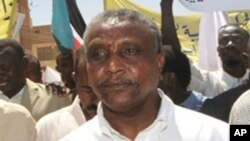South Sudan's ruling Sudan People's Liberation Movement has pulled out of the race for the Sudanese presidency, as well as from elections in Sudan's war-torn region of Darfur. The announcement came after days of indecision from within SPLM's leadership about how best to respond to allegations of vote rigging on the part of its tenuous peace partners in the north.
Late Wednesday evening, vice-chair of the SPLM Riek Machar announced that the former southern rebels were dropping out of the race against Sudanese president Omar Hassan al-Bashir, whom they accuse of engineering election fraud. The party will also not participate in Darfur elections, saying the crisis there has yet to be resolved.
The South's ruling party had previously slotted Yasir Arman, a secular northern Muslim, to challenge Bashir in national polls scheduled to begin April 11. Bashir's NCP is not running anyone against SPLM chairman Salva Kiir to retain the presidency of the semi-autonomous South, and SPLM officials say NCP sought SPLM to similarly not contest President Bashir's seat.
The two parties are joint governing partners under a 2005 North-South peace deal that ended a two-decade civil war between the mostly Arabized north and black African south, but tensions had been rising as national elections pitted the two peace parties against each other.
In recent days, SPLM has been forced to mediate between northern opposition parties, who claim that the election is already rigged and demand it be postponed until November, and Bashir's NCP, who have rejected claims of rigging and say elections will go on time.
Deputy Secretary General of the SPLM, Anne Itto, explaining Arman's withdrawal, said Thursday that the NCP had refused to listen to any of the opposition complaints.
"Our team did not just have discussions with the [opposition] political parties. They also went and engaged NCP, hoping that NCP would see the importance of creating an environment that is conducive for other political parties to participate. We did not reach any agreement with them," she said.. "They did not want to consider any of the issues raised."
In response to the NCP's hardline stance, the northern opposition forces were to decide Thursday whether to participate in the upcoming elections, or boycott them. The SPLM secretary general, Pagan Amum, had told the media that his party would join with the opposition parties if they decided to boycott the northern vote.
But SPLM's leadership seemed divided. President Bashir had openly threatened the former rebels that if they did not support the April elections, he would refuse them a prized independence referendum for the South scheduled for January.
When asked Wednesday morning on his way to an emergency political meeting in Juba if it was true SPLM would join in a northern boycott of the elections, the party vice-chair Riek Machar said that the SPLM leadership was still deliberating on its course of action. "No decision has been made towards that. It's unlikely, also, that there is a concerted effort to boycott," he said.
Some analysts, as well as members of the northern opposition, suspect the surprise announcement late Wednesday from Machar came on the heels of a secret deal between the two ruling parties.
A number of outstanding issues must be resolved between SPLM and the NCP in the lead-up to the referendum. Despite its rhetoric for "democratic transformation" in Sudan, few think that SPLM's leadership would take any steps that might threaten its long-sought independence vote.
But some say the actions and words of SPLM's leadership this week suggested a party seeking any middle ground, tightly squeezed between backing a clearly-flawed presidential vote on the one hand, and damaging peace relations by fully joining hands with its ruling partner's opposition on the other.
The two-decade war between the North and South ended in a 2005 peace deal, which stipulated a 6-year interim during which elections would be held, to be followed by the Southern secession referendum. An estimated two million people died during the conflict.
South Sudan's Ruling Party Pulls Out of Presidential Race




